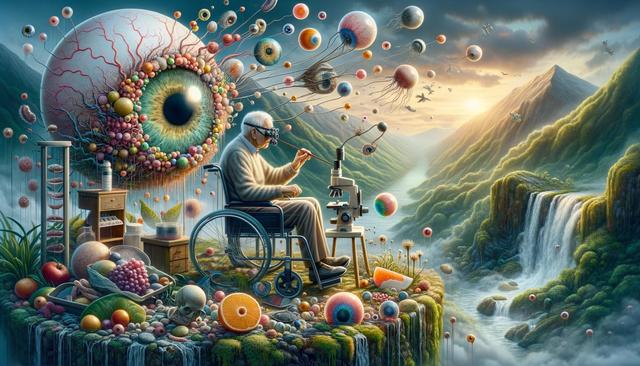Understanding Macular Degeneration: A Guide to Side Effects and Management
Macular degeneration causes vision loss, with side effects including blurred vision, dark spots, and difficulty seeing fine details. Early diagnosis can help manage symptoms and slow progression. Learn more about treatments and lifestyle adjustments to improve vision.

What is Macular Degeneration?
Macular degeneration is a progressive eye condition affecting the macula, the central part of the retina responsible for sharp, straight-ahead vision. It is a common cause of vision loss in older adults and is often associated with aging. There are two main types of macular degeneration: dry (atrophic) and wet (neovascular). The dry form is more common and progresses slowly, while the wet form is more severe and can lead to rapid vision loss.
This condition can significantly impact daily activities such as reading, driving, recognizing faces, and seeing fine details. Although macular degeneration does not lead to total blindness, the loss of central vision can make it difficult to perform many routine tasks. Understanding the condition and its symptoms is crucial to early detection and treatment.
Common causes and risk factors include:
- Aging (most cases occur in people over 60)
- Family history of the condition
- Smoking and poor diet
- High blood pressure and cardiovascular disease
- Prolonged sun exposure without eye protection
Knowing these risk factors can help individuals take preventive measures and seek regular eye exams to catch early signs of degeneration.
Key Side Effects and Symptoms
The side effects of macular degeneration vary depending on the stage and type of the disease. In its early stages, symptoms may be subtle or even unnoticeable. However, as the condition progresses, individuals often experience distinct visual changes that interfere with daily life.
Some of the most common side effects include:
- Blurry or fuzzy vision, especially in the center of the visual field
- Dark or empty areas in the center of vision
- Difficulty recognizing faces
- Need for brighter lighting when reading or doing close work
- Distorted vision, where straight lines appear wavy or bent
These symptoms can develop gradually over time, particularly in cases of dry macular degeneration. In contrast, wet macular degeneration may cause a sudden and noticeable decline in vision. Recognizing these early signs is essential to begin timely treatment and preserve as much vision as possible.
How Macular Degeneration Affects Daily Life
Living with macular degeneration often requires significant lifestyle adjustments. Since central vision is crucial for tasks like reading, driving, and using digital devices, the condition can affect both independence and quality of life. Many people report frustration due to the inability to perform tasks they once found simple.
Some daily challenges include:
- Reading books, newspapers, or screens without magnification
- Navigating unfamiliar environments safely
- Recognizing people’s faces, which can affect social interactions
- Performing hobbies like sewing, painting, or crafting
These changes can lead to emotional effects such as anxiety, depression, and social withdrawal. Emotional support, counseling, and vision rehabilitation services can help individuals cope with the psychological impact of vision loss.
Despite these challenges, many tools and resources are available to improve daily functioning. Low vision aids, such as magnifiers, high-contrast materials, and electronic reading devices, can make tasks easier. Orientation and mobility training can also help individuals navigate their surroundings more safely and confidently.
Treatment Options for Managing Symptoms
While there is no cure for macular degeneration, several treatments can help slow its progression and manage symptoms. The appropriate treatment depends on the type of macular degeneration and the severity of the condition. Early detection plays a crucial role in preserving vision and improving outcomes.
For dry macular degeneration, recommended strategies include:
- Taking specific nutritional supplements (such as vitamins C and E, zinc, and lutein)
- Adopting a diet rich in leafy greens, fruits, and omega-3 fatty acids
- Managing underlying health conditions like high blood pressure
- Regular monitoring with an Amsler grid to detect changes in vision
For wet macular degeneration, medical treatments may include:
- Injections of anti-VEGF medications to reduce abnormal blood vessel growth
- Photodynamic therapy, which uses light-activated drugs to seal leaking vessels
- Laser surgery in select cases to destroy abnormal blood vessels
These treatments can help stabilize or even improve vision in some patients. Ongoing research continues to explore new therapies, including gene therapy and stem cell treatment, which may offer future benefits.
Lifestyle Adjustments and Vision Support
Adapting to life with macular degeneration involves more than medical treatment—it also requires practical lifestyle changes to maintain independence and improve quality of life. Making proactive adjustments in the home and daily routines can significantly enhance visual comfort and safety.
Helpful lifestyle changes include:
- Improving lighting in all living areas with adjustable lamps and daylight bulbs
- Using high-contrast items, such as bold print books or dark cutting boards for light-colored foods
- Organizing household items consistently to reduce the need for visual searching
- Utilizing audio books, voice-activated devices, and screen readers
Support groups and vision rehabilitation programs can also be valuable. These services offer training in adaptive techniques, mobility skills, and the use of assistive technology. Connecting with others facing similar challenges can provide encouragement and practical advice.
Regular follow-ups with an eye care professional are essential to monitor changes in vision and adjust treatment plans as needed. Staying informed about the condition and new developments in care can empower individuals to take an active role in managing their vision health.
Conclusion: Taking Control of Macular Degeneration
Macular degeneration is a life-changing condition, but with early diagnosis, proper treatment, and supportive lifestyle changes, individuals can continue to lead active and fulfilling lives. Understanding the side effects and seeking timely care are key steps toward preserving vision and adapting effectively. Whether through medical treatments, vision aids, or emotional support, many resources are available to help manage the condition. Stay proactive with regular eye exams, healthy habits, and a strong support network to maintain the best possible vision and quality of life.